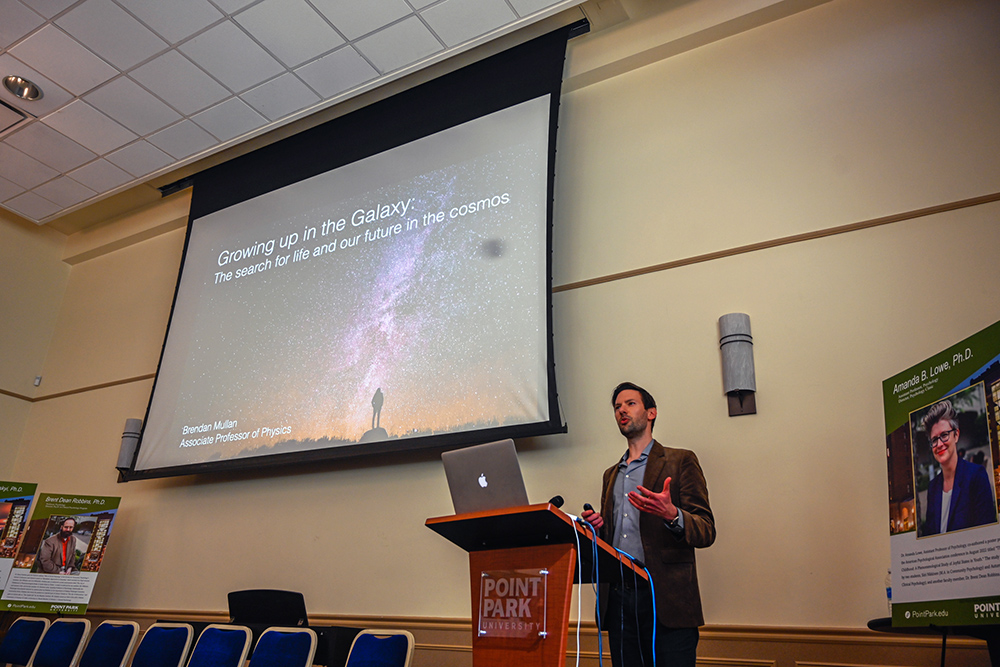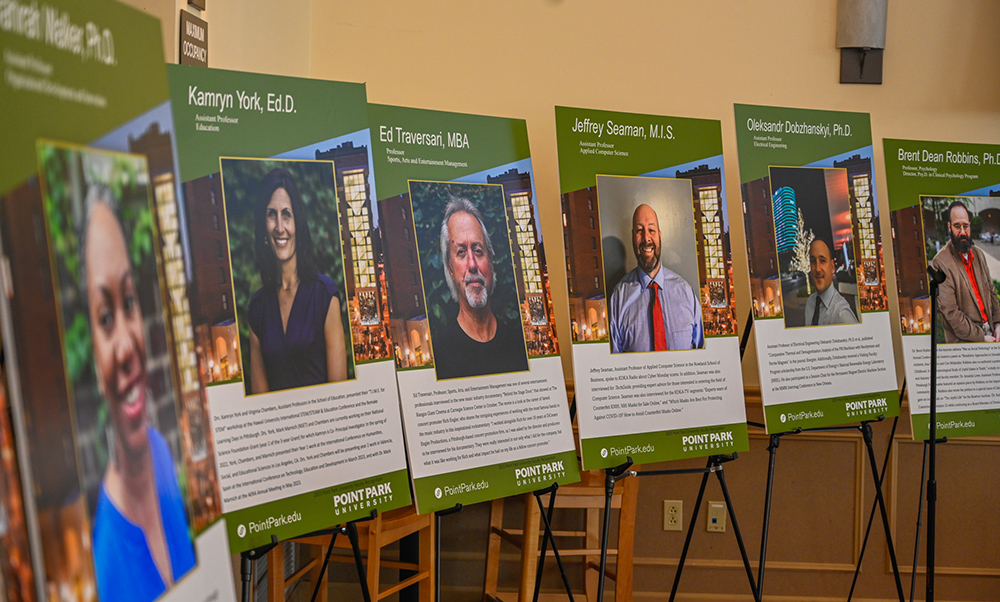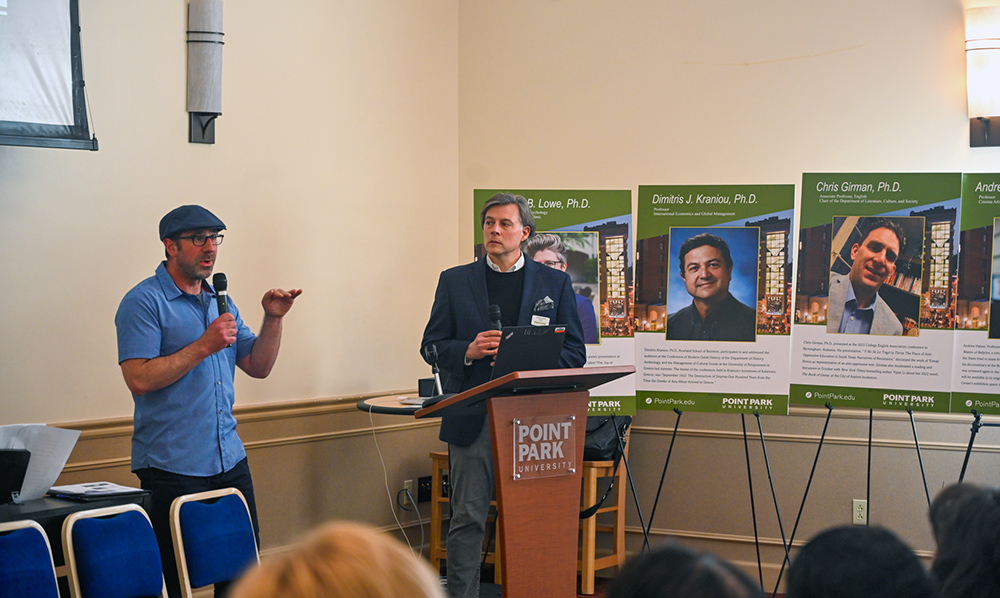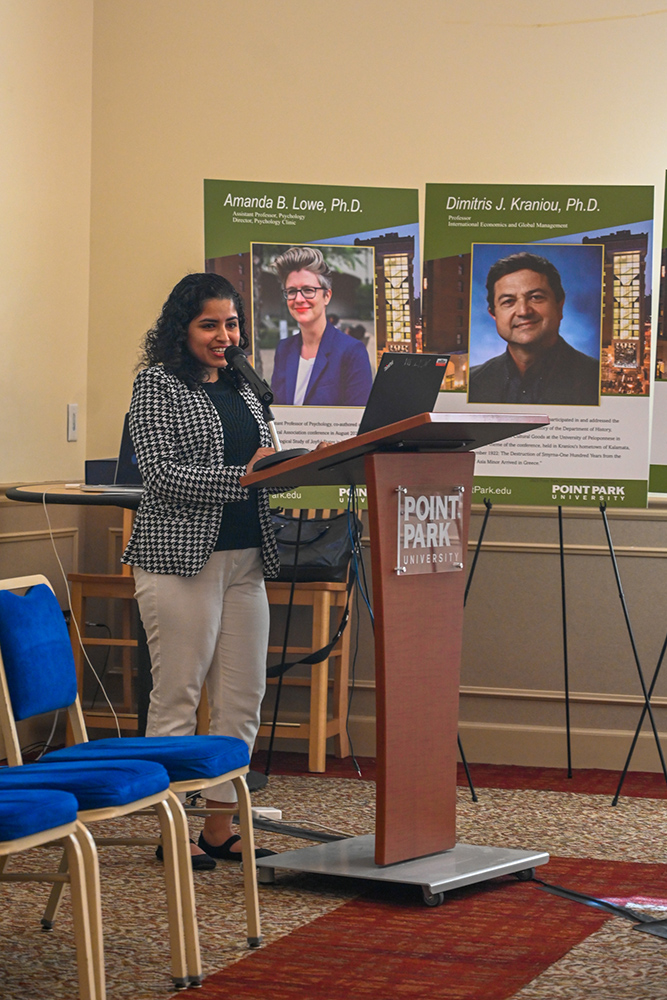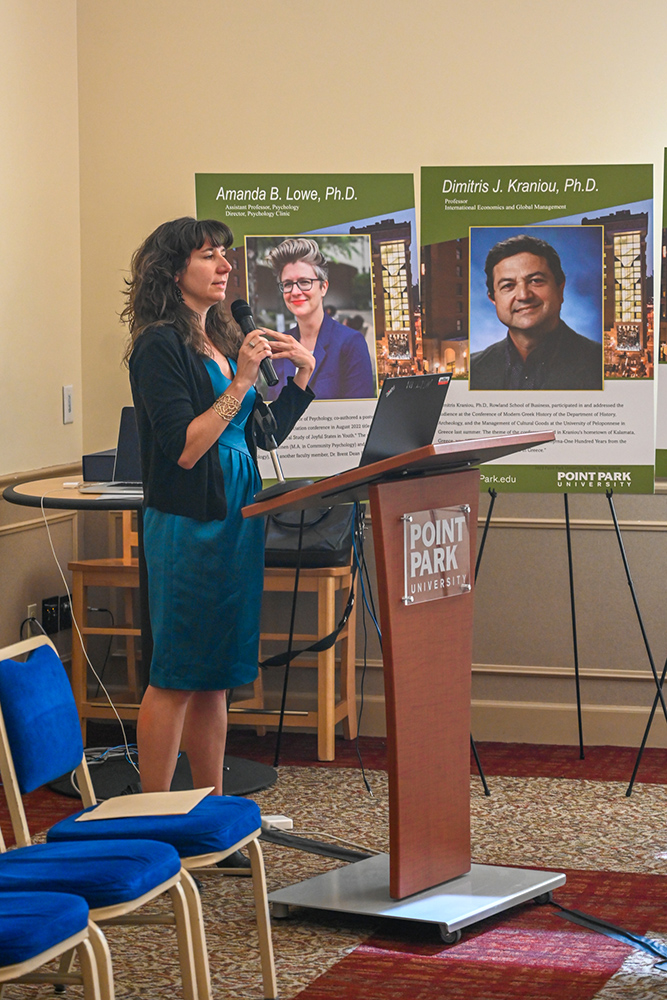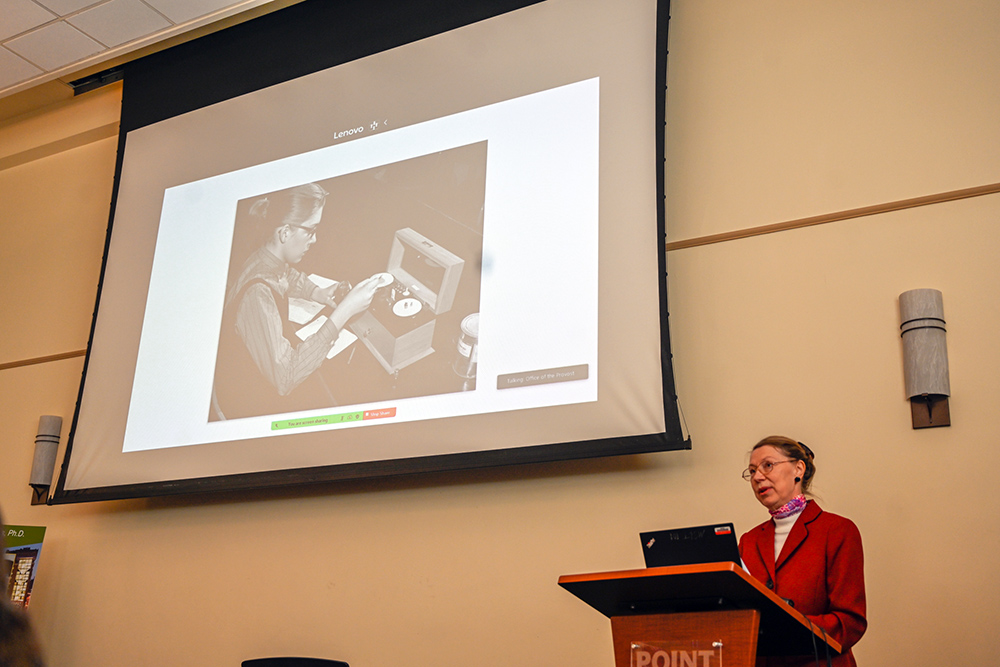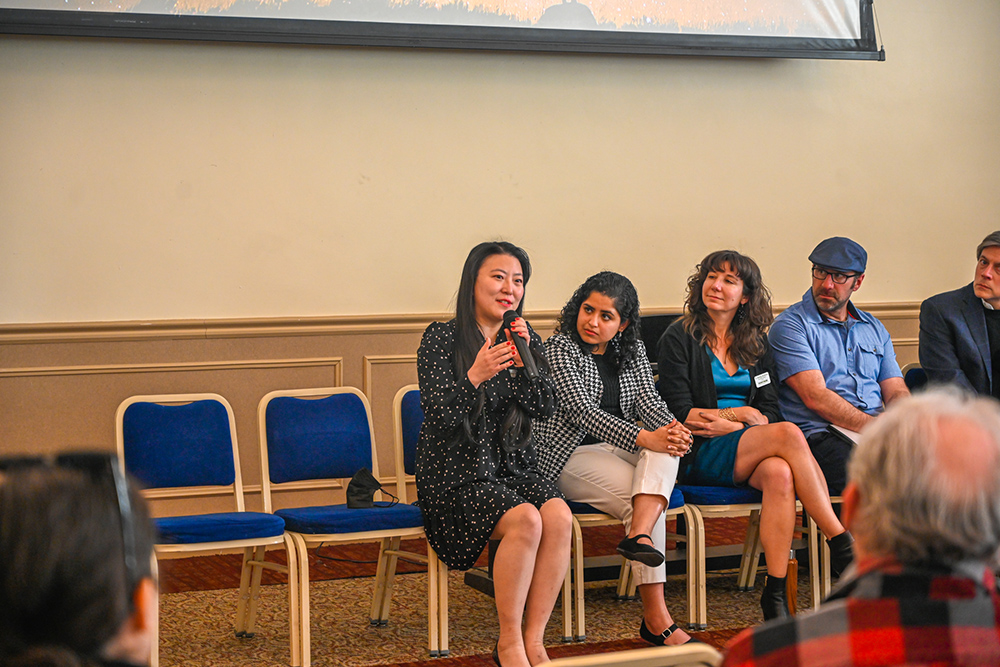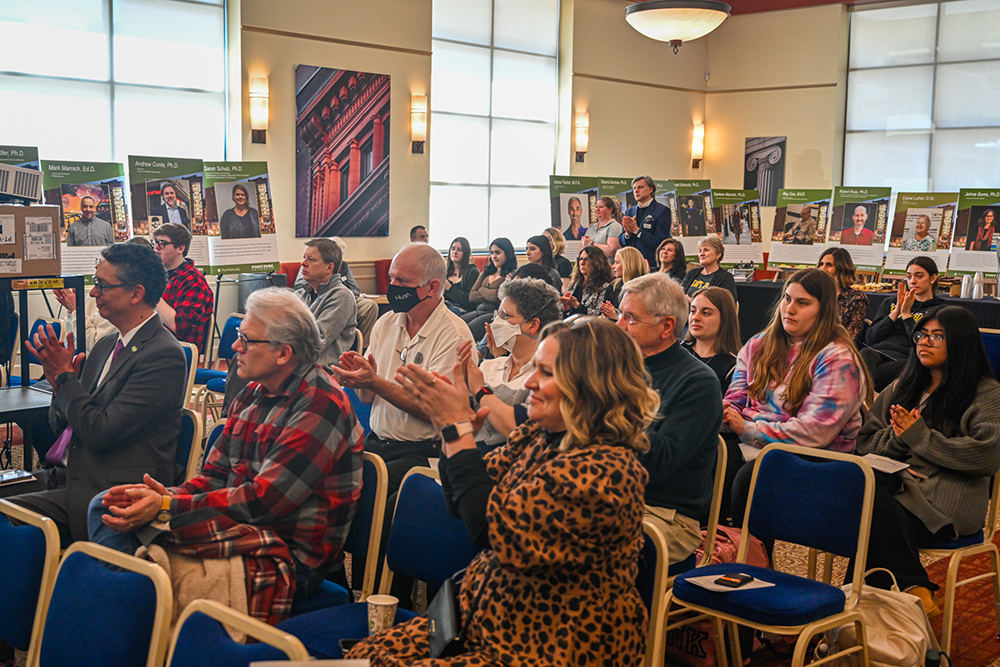Growing Up in the Galaxy: Physics Professor Discusses Extraterrestrial Intelligence at 2023 Finkelhor Lecture Monday, April 10, 2023
"Every student walks away from my courses with at least this much: That the universe is much bigger than they thought, and our place in space and time makes us both insignificant in size and scope, but also significant in purpose and potential."
The impact of Styx's hit "Renegade" on the Pittsburgh Steelers, the legacy of Point Park University's founder and the search for extraterrestrial intelligence: The 2023 Faculty Research Symposium & Finkelhor Lecture celebrated the varied research interests and work of professors from the School of Arts & Sciences, Rowland School of Business, School of Communication, School of Education and Conservatory of Performing Arts.
Brendan Mullan, Ph.D., associate professor of physics in the Department of Natural Sciences and Engineering, provided the keynote address, "Growing Up in the Galaxy," which explored current scientific findings on extraterrestrial intelligence and what those may mean for humans' long-term future on Earth and in the cosmos.
"It was a great honor and privilege first to be selected as the Finkelhor lecturer, but it felt even more significant during the symposium when I got to hear about the groundbreaking, fascinating research and professional work some of my colleagues are doing and learn more about the legacy of Dorothy Finkelhor," Mullan said. "I was just sitting there in disbelief during these talks, thinking, 'How did I get to be the keynote in an event with these talented educators?'”
Faculty presentations included:
- Matt Pascal, Ph.D., and Andrew Conte, Ph.D., “The Effect of Controlled External Stimulus on Game Outcome and Team Performance: An Analysis of THE RENEGADE EFFECT”
- Yan Pang, Ph.D., “Reimagining Humanity through Opera Theatre”
- Shamayeta Bhattacharya, Ph.D., “SHAKTHI: Studying Healthcare Accessibility among Kothi, Transgender and Hirja Individuals"
- Britney Brinkman, Ph.D., “Resilience, Resistance, and Transformation: Longitudinal Community-Engaged Research to Improve Girls’ Educational Experiences”
- Tatyana Dumova, Ph.D., “Dorothy C. Finkelhor: A Practical Idealist with a Vision"
In the Q&A below, Mullan reflects on his research and his teaching approach.
What inspired your lecture?
In short, Point Park’s dynamic, collaborative, interdisciplinary environment inspired me! A few years ago, a faculty member from the Department of Literature, Culture, and Society asked me to present during the undergraduate research symposium. The theme was “apocalyptic thinking,” so I pulled on the threads of technology, climate change and population dynamics. I put together a scientific and mathematical overview on where trends in these areas were taking us.
In the back of my head, I was thinking about astronomical research I worked on before coming to Point Park about the search for extraterrestrial intelligence (SETI). I had worked on developing observational searches for “technosignatures," i.e., identifying the waste heat or other indicators that other civilizations across the cosmos were doing something big with a lot of energy and resources. I always viewed this kind of SETI as searching for civilizations that were a little ahead of us, doing the sorts of things we always envisioned for ourselves in humanity’s future.
I always wondered why our searches came up short. I started connecting the dots to what I was looking at for the undergraduate symposium – that using a lot of energy and resources has some dramatic and alarmingly fast consequences for our climate and the biosphere. I teamed up with other astrobiologists from my research network and worked on this idea that there might be a connection between how alone we seem in the universe and the destructive potential of the path we’re on now. Our research is ongoing, but the results are clear. There’s no way to become a civilization that would easily show up in our SETI searches without inducing some apocalyptic-level warming or other effects on our home planet first.
What takeaways do you hope people gleaned from your presentation?
It all comes down to energy and choice. Our history of using fossil fuels has already significantly changed our climate. There is potential for many more, and worse, changes to come, but that depends on our choices.
If we choose to value consumption and exploitation of people and resources, then our hunger for energy will continue to increase, and we’ll never get the peaceful, equitable, advanced civilization we typically like to envision for our future. If we’re more mindful of our path and take better care of ourselves and our planet, then we’re going to live through the next century just fine. It requires really thinking about the future – not just tomorrow or next year or the fiscal quarter, but the next 10, 50, 100, and even several hundred years. My hope is that we can have this conversation and think more about the deep future. My fear is that we’ve become iPhone-addled lemmings too busy rushing around, scrolling through TikTok videos, to notice the cliff of our own making ahead of us. I hope we look up from our phones and the navel-gazing trivialities they suck us into before it’s too late.
How does this lecture connect to what you share with students in the classroom?
We touch on SETI and the meaning of life in the universe in the "Astronomy, Space and Time" course. We focus on predicting where life could be in the universe and how to look for it in the course "Are We Alone? The Search for Life in the Universe." The latter course in particular is very open and interdisciplinary, and students bring a lot of different perspectives and fields to the table in our discussion. The number of advanced civilizations we can detect out there depends sensitively on how long civilizations can last, so these issues we’re dealing with now – climate change, social justice and inequality, technological change – do come up a lot.
We spend a little time talking about my research, but that’s just one piece of the puzzle I leave out on the table for them in trying to understand why we haven’t seen evidence of extraterrestrial civilizations yet. Every student walks away from my courses with at least this much: That the universe is much bigger than they thought, and our place in space and time makes us both insignificant in size and scope, but also significant in purpose and potential. The future and cosmos are still open, and what we do with them is up to us.


